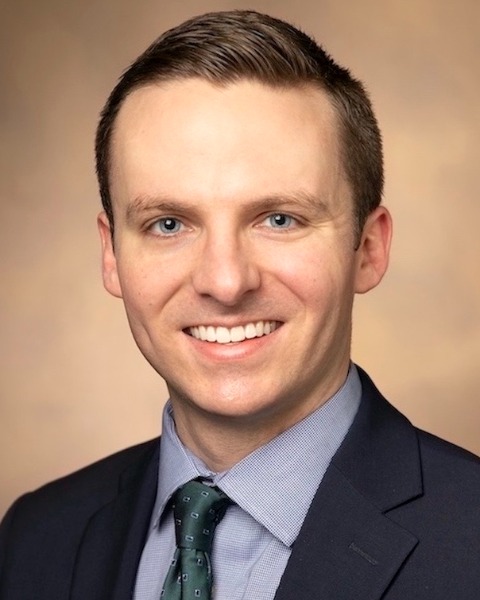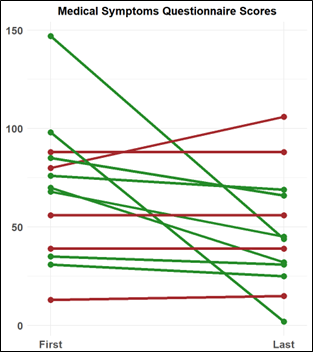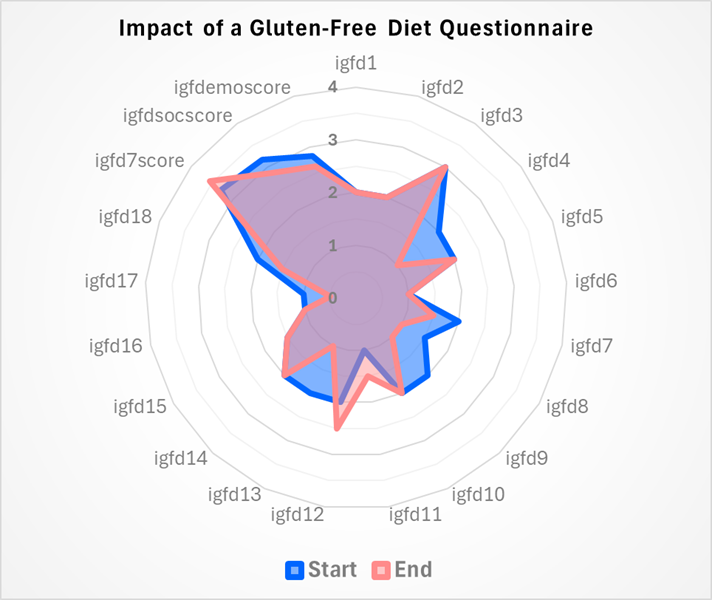Sunday Poster Session
Category: Small Intestine
P1937 - A Functional Medicine Program for Patients With Celiac Disease Improves Symptoms and Fatigue Severity
Sunday, October 26, 2025
3:30 PM - 7:00 PM PDT
Location: Exhibit Hall

Thomas M. Strobel, MD
Vanderbilt Inflammatory Bowel Disease Clinic
Nashville, TN
Presenting Author(s)
Thomas Strobel, MD1, Alyson Basil, BA2, Joanna Perl, MS, RD2, Emily Spring, PA-C1, Candice Vaden, APRN1, Sarah Campbell, LCSW1, Randi Robbins, LCSW1, Julia Carlson, RD1, Sydney Elliott, RDN1, Stephanie J. Ardell, 1, Dawn Adams, MD, MS2, Dawn B. Beaulieu, MD, FACG1
1Vanderbilt Inflammatory Bowel Disease Clinic, Nashville, TN; 2Vanderbilt University Medical Center, Nashville, TN
Introduction: Celiac disease (CeD) is an autoimmune response to gluten that leads to whole-body inflammation, nutritional deficiencies, and a myriad of symptoms including diarrhea, fatigue, bloating, joint pains, headaches, and neuropathies. The only approved treatment is dietary gluten elimination. This can be challenging for patients who live in a society filled with gluten and food-centric socialization, and burden of treating the disease adversely affects quality of life. A Functional Medicine program was designed to enhance the treatment of patients experiencing symptoms related to CeD as well as reduce the negative impact of living on a gluten-free diet.
Methods: The program included six weekly sessions led by a certified Functional Medicine practitioner. Sessions explored nutrition, stress, sleep, and exercise in the context of their disease. Participants were asked to complete the Fatigue Severity Scale (FSS), Medical Symptoms Questionnaire (MSQ), and Impact of a Gluten Free Diet Questionnaire (IGFDQ) at each visit.
Results: 14 patients with CeD enrolled in the program. 13 completed more than one session. 62% of the participants reported improvement in their MSQ and FSS. 12 participants completed more than one IGFDQ. At the start, 75% of participants reported being negatively impacted by their gluten-free diet at least “sometimes” in the prior week. By the end, only half of the participants reported the same level of burden.
Discussion: The treatment of CeD is places a significant psychosocial burden on patients. A strong majority of our participants reported negative impacts on their social and emotional health by having to maintain a gluten-free diet. The authors concluded that delivering lifestyle changes through a multidisciplinary, holistic, functional medicine approach can help improve medical symptoms and fatigue severity. They also found a modest improvement in social well-being through participation in the group-based educational sessions.

Figure: Medical Symptoms Questionnaire scores before and after completion of the Functional Medicine Program. Green lines indicate individual improvement in scores, while brown lines indicate lack of improvement.

Figure: Median scores on each question of the Impact of a Gluten-Free Diet Questionnaire before and after completion of the Functional Medicine Program.
Disclosures:
Thomas Strobel indicated no relevant financial relationships.
Alyson Basil indicated no relevant financial relationships.
Joanna Perl indicated no relevant financial relationships.
Emily Spring indicated no relevant financial relationships.
Candice Vaden indicated no relevant financial relationships.
Sarah Campbell indicated no relevant financial relationships.
Randi Robbins indicated no relevant financial relationships.
Julia Carlson indicated no relevant financial relationships.
Sydney Elliott indicated no relevant financial relationships.
Stephanie Ardell indicated no relevant financial relationships.
Dawn Adams indicated no relevant financial relationships.
Dawn Beaulieu: Abbvie – Advisory Committee/Board Member, Consultant. Bristol Myers Squibb – Consultant. Celltrion – Consultant. Institute of Functional Medicine – Consultant. Takeda – Advisory Committee/Board Member, Consultant.
Thomas Strobel, MD1, Alyson Basil, BA2, Joanna Perl, MS, RD2, Emily Spring, PA-C1, Candice Vaden, APRN1, Sarah Campbell, LCSW1, Randi Robbins, LCSW1, Julia Carlson, RD1, Sydney Elliott, RDN1, Stephanie J. Ardell, 1, Dawn Adams, MD, MS2, Dawn B. Beaulieu, MD, FACG1. P1937 - A Functional Medicine Program for Patients With Celiac Disease Improves Symptoms and Fatigue Severity, ACG 2025 Annual Scientific Meeting Abstracts. Phoenix, AZ: American College of Gastroenterology.
1Vanderbilt Inflammatory Bowel Disease Clinic, Nashville, TN; 2Vanderbilt University Medical Center, Nashville, TN
Introduction: Celiac disease (CeD) is an autoimmune response to gluten that leads to whole-body inflammation, nutritional deficiencies, and a myriad of symptoms including diarrhea, fatigue, bloating, joint pains, headaches, and neuropathies. The only approved treatment is dietary gluten elimination. This can be challenging for patients who live in a society filled with gluten and food-centric socialization, and burden of treating the disease adversely affects quality of life. A Functional Medicine program was designed to enhance the treatment of patients experiencing symptoms related to CeD as well as reduce the negative impact of living on a gluten-free diet.
Methods: The program included six weekly sessions led by a certified Functional Medicine practitioner. Sessions explored nutrition, stress, sleep, and exercise in the context of their disease. Participants were asked to complete the Fatigue Severity Scale (FSS), Medical Symptoms Questionnaire (MSQ), and Impact of a Gluten Free Diet Questionnaire (IGFDQ) at each visit.
Results: 14 patients with CeD enrolled in the program. 13 completed more than one session. 62% of the participants reported improvement in their MSQ and FSS. 12 participants completed more than one IGFDQ. At the start, 75% of participants reported being negatively impacted by their gluten-free diet at least “sometimes” in the prior week. By the end, only half of the participants reported the same level of burden.
Discussion: The treatment of CeD is places a significant psychosocial burden on patients. A strong majority of our participants reported negative impacts on their social and emotional health by having to maintain a gluten-free diet. The authors concluded that delivering lifestyle changes through a multidisciplinary, holistic, functional medicine approach can help improve medical symptoms and fatigue severity. They also found a modest improvement in social well-being through participation in the group-based educational sessions.

Figure: Medical Symptoms Questionnaire scores before and after completion of the Functional Medicine Program. Green lines indicate individual improvement in scores, while brown lines indicate lack of improvement.

Figure: Median scores on each question of the Impact of a Gluten-Free Diet Questionnaire before and after completion of the Functional Medicine Program.
Disclosures:
Thomas Strobel indicated no relevant financial relationships.
Alyson Basil indicated no relevant financial relationships.
Joanna Perl indicated no relevant financial relationships.
Emily Spring indicated no relevant financial relationships.
Candice Vaden indicated no relevant financial relationships.
Sarah Campbell indicated no relevant financial relationships.
Randi Robbins indicated no relevant financial relationships.
Julia Carlson indicated no relevant financial relationships.
Sydney Elliott indicated no relevant financial relationships.
Stephanie Ardell indicated no relevant financial relationships.
Dawn Adams indicated no relevant financial relationships.
Dawn Beaulieu: Abbvie – Advisory Committee/Board Member, Consultant. Bristol Myers Squibb – Consultant. Celltrion – Consultant. Institute of Functional Medicine – Consultant. Takeda – Advisory Committee/Board Member, Consultant.
Thomas Strobel, MD1, Alyson Basil, BA2, Joanna Perl, MS, RD2, Emily Spring, PA-C1, Candice Vaden, APRN1, Sarah Campbell, LCSW1, Randi Robbins, LCSW1, Julia Carlson, RD1, Sydney Elliott, RDN1, Stephanie J. Ardell, 1, Dawn Adams, MD, MS2, Dawn B. Beaulieu, MD, FACG1. P1937 - A Functional Medicine Program for Patients With Celiac Disease Improves Symptoms and Fatigue Severity, ACG 2025 Annual Scientific Meeting Abstracts. Phoenix, AZ: American College of Gastroenterology.
